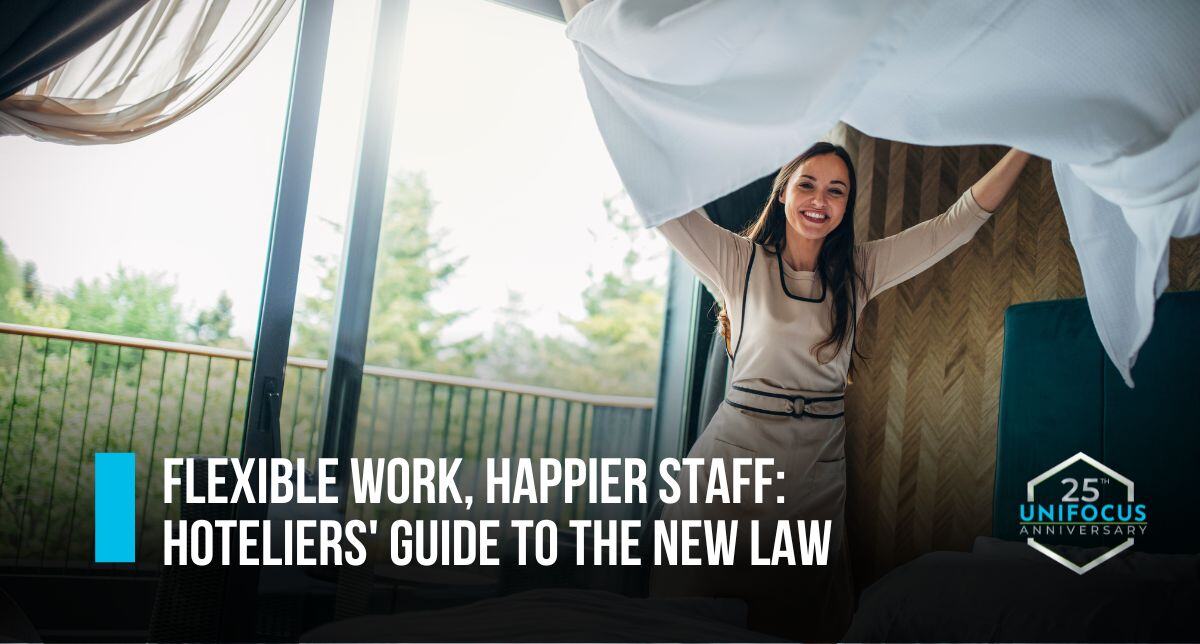Navigating Flexible Working in Hospitality
As the UK hospitality sector adapts to the sweeping changes brought by the Flexible Working Act 2023, effective from April 2024, hoteliers are tasked with navigating this new landscape. This legislation gives employees the right to request flexible working arrangements from their very first day of employment, which marks a major change for hoteliers. While this brings some challenges, it also offers opportunities to enhance employee satisfaction and streamline operations. Understanding the key elements of this new law is essential for hoteliers, not only to stay compliant but to take advantage of the benefits that flexible working can bring.
In this post, we’ll explore what flexible working means for your hotel, how to prepare for it, and the steps you can take to implement it successfully.
Key Aspects of the Flexible Working Act 2023
The Flexible Working Act 2023 is designed to provide employees with greater control over their work environment, helping to foster a more engaged and productive workforce. The law requires employers to respond to flexible working requests, but it also offers hoteliers an opportunity to rethink their operational strategies. Let’s break down the essentials:
- Flexible Working Requests: From day one, all employees have the right to request flexible working arrangements. This could mean altering their working hours, adopting different shift patterns, or even requesting remote working (where applicable). Employees can ask for part-time hours, compressed hours, job sharing, or changes to their work location, giving them greater autonomy over how they work.
- Response Time: Employers must respond to these requests within two months. If you choose to deny a request, you’re required to provide a clear, fair, and justifiable reason. This promotes transparency and fairness in the workplace, ensuring employees feel heard.
Understanding these two key points helps build a foundation for how you can use this law to enhance your workforce management. By responding thoughtfully to requests and fostering a culture of openness, you set the stage for a more satisfied and loyal team.
Benefits of Implementing Flexible Working
Many employers in the UK hospitality sector might be wondering how flexible working will impact their business. Fortunately, when done right, it can be a win-win. Below are several ways in which offering flexibility can benefit your hotel:
- Boost Employee Satisfaction: Employees today value the ability to balance their work life with personal commitments. Whether it's childcare, education, or other obligations, flexible work arrangements make it easier for them to achieve this balance. Happier employees are more motivated, which can translate into better service for your guests.
- Improve Staff Retention: High turnover is often a challenge in hospitality. However, by providing flexible working options, you can reduce the likelihood of employees leaving. A satisfied team member is less likely to seek work elsewhere, saving you the costs and time of recruiting and training new staff.
- Attract Top Talent: In an increasingly competitive job market, offering flexible working is a major drawcard. Talented individuals are more likely to consider your hotel if they know you support a healthy work-life balance.
- Enhance Productivity: Flexibility allows employees to work when they are at their most productive. Whether it’s early mornings or late evenings, employees who have control over their schedules often get more done in less time.
- Reduce Absenteeism: With flexible work options, employees can handle personal responsibilities without needing to take time off. This leads to fewer absences, which helps keep your operations running smoothly.
By embracing flexible working, you're not only complying with the law but also setting your hotel up for long-term success through a more engaged, motivated, and stable workforce.
Preparing Your Hotel for Flexible Working
To make flexible working a success, preparation is key. Implementing new work arrangements isn’t as simple as adjusting a few schedules—it requires thoughtful planning and communication. Here’s how you can start preparing:
- Assess Employee Needs: Before implementing any changes, it’s important to understand what your employees actually want. Conduct surveys or hold informal meetings to gather feedback. Find out who would benefit from part-time or flexible hours and which roles could accommodate remote working or job sharing. This will give you a clearer picture of what adjustments are necessary and feasible.
- Utilise Technology: Managing a flexible workforce without the right tools can be challenging, but workforce management platforms like Unifocus make it much easier. These tools allow you to manage schedules, track employee hours, and maintain operational efficiency without the headaches. Whether it's shift scheduling or labour forecasting, technology can streamline the process.
- Train Managers Effectively: Managers are the bridge between your flexible work policies and their implementation. It’s important to provide them with the right training so they can handle flexible working requests and manage diverse schedules smoothly. This includes understanding how to use scheduling tools, keeping lines of communication open, and supporting their teams through any challenges.
- Monitor and Adjust Continuously: Flexibility isn’t a ‘set it and forget it’ type of change. You’ll need to continuously assess how the flexible working arrangements are impacting both your employees and your operations. Regular feedback from your team and managers will help you make necessary adjustments to ensure the system works for everyone.
Implementing Flexible Working: Steps to Get Started
Once you have a plan in place, it’s time to take action. Implementing flexible working doesn’t have to be complicated, but it does require careful thought and execution. Here are the key steps to get started:
- Update Your Policies: Review your current employment policies and revise them to include flexible working arrangements. Ensure that these new policies comply with the Flexible Working Act and are clearly communicated to all staff. You want to make sure that everyone understands their rights and options.
- Engage Your Staff: Transparency is key to getting your employees on board. Host meetings, provide training sessions, and encourage open dialogue about what flexible working could look like at your hotel. When your team feels included in the process, they’re more likely to embrace the changes.
- Consult Legal Experts: It’s always a good idea to seek legal advice when making changes to employment policies. Consulting a legal professional can ensure that your new policies are fully compliant with the law and that your processes are solid.
- Plan for Operational Adjustments: Introducing flexible work arrangements will likely require adjustments to your operational processes. This is where technology can be a game-changer. Tools like AI-driven labour forecasting can help you predict staffing needs and manage shifts more efficiently, ensuring your hotel remains fully operational while offering flexible work options.
How Hotel Technology Supports Your Flexible Working Strategy
At Unifocus, we understand the unique challenges hoteliers face when implementing flexible working. That’s why we’ve designed a suite of tools to help you manage your workforce efficiently and effectively, no matter how complex your scheduling needs are. Here’s how we can support your hotel:
- Optimise Staffing Levels: Our advanced scheduling tools ensure that your hotel is always appropriately staffed, even with flexible work patterns. We use historical data and real-time analytics to help you predict staffing needs, allowing you to balance flexibility with operational demands.
- Enhance Team Communication: Effective communication is crucial when managing a flexible workforce. Our platform enables seamless communication across your entire team, ensuring that all staff members, regardless of their schedules, are kept in the loop.
- Streamline Efficiency: Managing flexible work schedules manually can be time-consuming and error-prone. With our automated scheduling system, you can save time and ensure that shifts are distributed fairly, considering employee preferences and availability.
- Ensure Compliance: Labour laws can be complex, but Unifocus helps you stay compliant by tracking working hours, monitoring overtime, and ensuring that all flexible working arrangements meet legal requirements.
Moving Forward with Flexible Working in Hospitality
The UK hospitality sector is on the cusp of a new era with the adoption of flexible working practices. For hoteliers, this presents both a challenge and an opportunity. By embracing flexible work arrangements and leveraging Unifocus’s comprehensive solutions, you can create a more satisfied, productive, and loyal workforce. Not only will you comply with the new legislation, but you’ll also position your hotel as an attractive employer in a competitive job market.
Ready to take the next step? With Unifocus as your partner, you can confidently navigate the changing landscape of workforce management and create a workplace that works for everyone.







